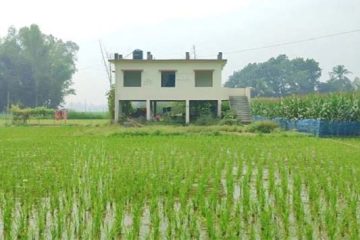Thousands kill each other, climate change blamed
Emran Hossain
 This year’s frequent, untimely winter rain left bees, a key pollinator, in an unprecedented conflict as they died in thousands fighting over food, beekeepers and government agricultural extension officials said.
This year’s frequent, untimely winter rain left bees, a key pollinator, in an unprecedented conflict as they died in thousands fighting over food, beekeepers and government agricultural extension officials said.
Affected beekeepers said that they never faced a crisis of food for bees to this extent in more than a decade since they began keeping bees for collecting honey.
While untimely winter rain harmed crop plants physically, eventually leading to reduced flowering, it hampered pollination as well for bees do not come out of their colonies on gloomy, rainy days, entomologists and agronomists explained.
These factors together led to the present food crisis, they said, in an early indication of a substantial fall in winter crop production this year.
Beekeepers are certain about their honey collection dropping by 90 per cent while agriculturists estimated the production of winter crops such as mustard, coriander and black cumin to fall by 40 per cent at least.
Migratory beekeepers heavily depend on mustard, coriander and black cumin production. These crops flowered far less than usual giving rise to deadly fights in commercially kept bee colonies.
‘Bees killed each other in thousands even before some of us could realise what was actually going on,’ said Kazi Monir Hossain, treasurer, Bee Keepers Foundation, a substantially large association of beekeepers in the country.
Monir estimated that the conflict over the food crisis alone cost 1.4 million bee lives in the field they took their wooden bee boxes in for collecting honey at Mirzapur, Tangail.
‘Bees are so aggressive this year that you cannot even go near them, let alone checking on the honey collection,’ he said.
Monir and two other beekeepers usually use mustard fields with a radius of 3km for collecting honey during winter. But this year four additional beekeepers joined them, putting bees in tough competition for fields amid flower scarcity.
Monir returned to his Gazipur home, setting to feeding bees sugar, scrapping his plan of moving around fields. ‘The problem with sugar is that it is damn expensive and we can provide bees far less than what is needed,’ he said, hinting at an imminent fall in his bee population.
Sher-e-Bangla Agricultural University’s entomology professor Mohammed Shakhawat Hossain also had reports of bees suffering a food crisis in Manikganj and Sirajganj.
Wild bees are likely to face starvation, perhaps the worst in decades, he said, with no official effort to help them in this situation. ‘Bee conflicts can be deadly and destroy colonies overnight,’ Shakhawat told New Age.
Migratory beekeepers take a certain route every year moving between crop fields depending on their time of flowering. In winter, beekeepers target mustard fields rented in exchange for a fixed amount. Central Bangladesh particularly gets busy during winter with beekeepers activities.
Sowed in mid or late November, swathes of central Bangladesh turn yellow by December. But a trip by New Age to mustard fields in Tangail found the colour greatly missing as mustard plants lay on their sides and rather looked green.
‘A beekeeper in Nayapara of Mirzapur lost bees worth 25 bee boxes out of his total 300 bee boxes,’ said Nuruzzaman Khan, sub-assistant agriculture officer, Mirzapur.
The honey production, he said, also fell to just one tonne this year from eight tonnes last year at Bhatgram, a village in Mirzapur.
After mustard was harvested, the beekeepers were supposed to relocate to coriander and cumin fields in districts such as Faridpur, Madaripur, Gopalganj and Shariatpur.
But the beekeepers could not make the move this year as rain delayed their cultivation resulting in delayed flowering. ‘Untimely winter rain greatly interrupted the natural synchronisation of flowering,’ said Shakhawat Hossain.
On the first few days of this winter in December, record-breaking rain left crop fields inundated deep in water and the stormy wind whipped the crop plants largely on their side.
Many fields had to be sown again while others saw their plants, accustomed to growing in sunny and dry weather, grow up weak, barely blooming amid scattered light rain or drizzle.
Re-sowed crop plants after enduring inclement weather flowered late and less, especially in areas such as Faridpur and Madaripur.
Before these crops could mature another round of record-breaking winter rain came in the first week of February, accompanied by wind rising up to 30km per hour.
‘Rain washes away pollen,’ said Bangladesh Agricultural University agronomy professor Parvez Anwar, associating it with a decline in yield. ‘This has become undeniable that weather is changing,’ he said.
‘Nowadays winter sets in late, brings rain and withdraws earlier than we are used to,’ Parvez said, adding that it could be linked only with climate change impacts.
The February rain shocked beekeepers even more for it came when litchi trees were about to bloom.
‘Rain at this time could send a wrong message to litchi trees that their reproductive season was over,’ said Parvez. ‘Trees may start growing leaves instead of blooming,’ he added.
Reports from beekeepers are actually worrying for they saw new leaves growing on in many litchi trees in Dinajpur, Thakurgaon, Gazipur, Sonargaon, Ishwardi, Jashore and Magura.
After staying around coriander and black cumin fields in January and February, the migratory beekeepers converge on litchi orchards in March.
In summer, they bring their bees to mango orchards. ‘Bee population could greatly decimate this year,’ feared beekeepers Kazi Monir Hossain.
Agriculturists warned that bee population fall may spell bad news for humans for bees are responsible for about 70 per cent of all crop pollination, essential for plant reproduction.
In the long run, a fall in the bee population could snowball into a food crisis.






